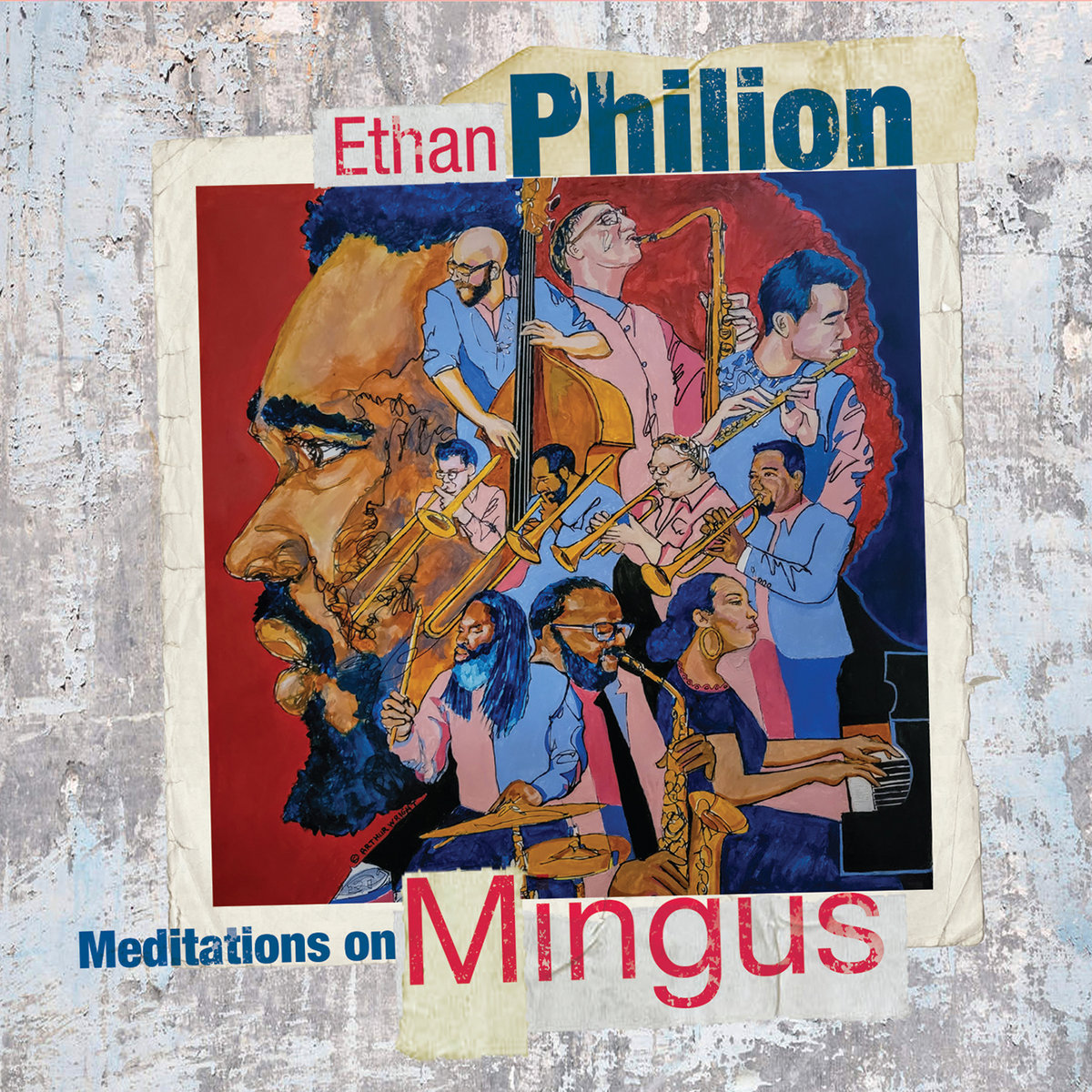
Album review: Ethan Philion Meditations on Mingus (Sunnyside)
Ethan Philion will present the full-ensemble “Meditations on Mingus” at the Chicago Jazz Festival on Sept. 2, and at the North Street Cabaret in Madison on Sept. 10, and a quartet version at Bar Centro in Milwaukee on Sept. 11.
Imagine a sculptor laboring over the Mount Rushmore of modern jazz giants and, somehow, forgetting about Charles Mingus. Through some boisterous psychic phenomenon, Mingus would barge into the artist’s consciousness and muscle his way into the layout of great granite figures. Mingus had a personality as large as his talents, and his social consciousness. These qualities all arise in a simmering stew called Meditations on Mingus by Chicago bassist-arranger and bandleader Ethan Philion.
Key to this project’s accomplishment is Philion understanding how pointedly Mingus’s 1960s music addresses America’s open societal wounds and flaws of today. This 10-piece band (including Milwaukee trumpeter Russ Johnson) bristles, wails, and swings like a 10-headed-demon inspired by the jazz gods. Mingus emerged from jazz god Ellington, retaining The Duke’s gifts for lyricism and fine detail. Yet Mingus upped the quotient of fiery, chest-pounding large-ensemble jazz.

Ethan Philion’s Mingus Big Band live at the Green Mill in Chicago. Courtesy ethanpilion.com
For example, on the opening “Once Upon a Time in a Holding Corporation called Old America,” the music ripples and reaches for the sky while keeping its collective feet deep in the funky earth. It evokes the profound income inequality that is worse today than ever. “Haitian Fight Song” boils and stomps, exemplifying how Mingus horn ensembles could mutate into one strangely beautiful creature of defiance.
“Pithecanthropus Erectus” is a striking musical portrait of homo sapiens rising from ape to human; it’s superbly orchestrated myriad voices, from cacophony to harmonized reason (and back), comments on the struggles of “man” to truly achieve humanity. Philion’s liner notes include an ominous Mingus quote to help signify the tune: “His own failure to realize the inevitable emancipation of those he sought to enslave…deny him not only the right of ever being a man, but finally destroy him completely.”

Bassist-arranger-bandleader Ethan Philion with trumpeter Victor Garcia. Courtesy Ethan Philion
Blues-infused, mournful and dramatic, “Meditation on a Pair of Wire Cutters” is a vivid small-picture evocation of a man’s incarceration, strengthened and sustained by dreams of freedom.
By contrast, “Remember Rockefeller at Attica,” is an ironically titled big picture on prison’s institutional racism. In 1971, New York Gov. Nelson Rockefeller notoriously rejected a requested visit to Attica Prison to address the black inmates’ grievances, thus spurring a prison uprising, which 1,000 white state troopers smashed by killing 33 inmates and 10 hostages. President Richard Nixon spun the tragedy as a triumph of governmental justice. Medical examiners confirmed that all but the deaths of one officer and three inmates were caused by law enforcement gunfire.[1][10] The New York Times writer Fred Ferretti said the rebellion concluded in “mass deaths that four days of taut negotiations had sought to avert”. The Attica Uprising has been described as a historical event in the prisoners’ rights movement.
Throughout Meditations, Philion conveys Mingus’s brilliance with tight-yet-liberated ensembles, bounding with call-and-response passages, and an inner fire that spurs soloists to heights of fire and ardor (especially alto sax player Rajiv Halim, on the bracing “Prayer for Passive Resistance”).
In referring back to the music as I wrote this, I’m continually captivated by the richness of the compositions, arrangements and the colorful soloists. Jazz doesn’t get any better.
Remember Rockefeller, sure, but remember Mingus indeed – hearing this album he’s as alive as a man breathing right down your neck.

Charles Mingus. Courtesy New England Conservatory of Music
___________
This review was originally published in shorter form in The Shepherd Express, here: Mingus music review
For information on, and to purchase, this album, visit: https://ethanphilion.com/home

